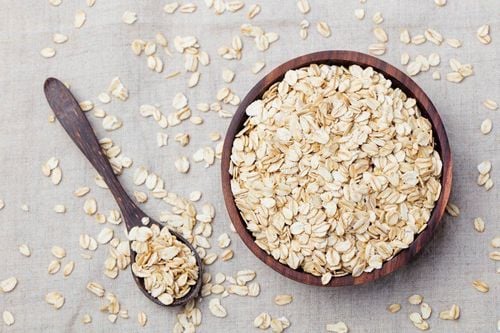1. Changes in a 9-month-old baby
Before answering the question "Is a 9-month-old baby weighing 7.5kg considered malnutrition?", parents need to know what changes a 9-month-old baby goes through. Then we can understand whether the baby's development is really good or not
Each baby will have a different rate of development, and the changes of a 9-month-old baby also depend on gender. At this stage, babies can play by themselves, hold objects, wave goodbye, say "ah ah ah"... This is also a way for babies to express their emotions through sounds, gestures, and body language. Parents may see babies crawling all over the house, but their actions are still clumsy and not completely flexible. However, parents should not worry too much because the time for a baby to develop can vary from child to child.
2. Weight of a 9-month-old baby
First-time parents often have many questions about their baby's development. That also includes the question of how much a 9-month-old baby weighs and whether a 9-month-old baby weighing 7.5 kg meets the standard. According to the World Health Organization, the average weight of a 9-month-old boy is between 8.1 and 10 kg, and the average weight of a 9-month-old girl is between 7.3 and 9.3 kg.
Based on the World Health Organization's standards, a 9-month-old baby weighing 7.5 kg needs to have their gender determined in order to make a specific conclusion according to this standard.

To achieve the weight standard set by the World Health Organization, children need to maintain a scientific diet so that they can continue to grow healthily. At this stage, mothers should continue to breastfeed their babies as much as possible and should not force them to drink formula if they don't like it. Each 9-month-old baby's meal, parents need to try to meet the nutritional needs of the baby and provided through four food groups including: protein-rich food group - meat, fish, eggs, shrimp, crab, eel... to help build the body and synthesize antibodies to protect the body; a group of foods rich in fat - cooking oil, animal fat, butter, cheese... to provide energy in the most concentrated form. Fat helps the baby have good skin, and at the same time helps absorb fat-soluble vitamins and develop brain cells and the nervous system; a group of foods rich in starch - flour, rice, noodles, vermicelli, pho... to provide energy and fiber necessary for children; a group of foods rich in vitamins and minerals - green vegetables, ripe fruits... to provide vitamins and minerals to regulate the body's activities, especially rich in fiber to prevent constipation.
9-month-old babies should be encouraged to use thicker and coarser foods. Because at this stage, the baby has already started teething and to form habits and skills of chewing and swallowing the baby is proficient. Therefore, parents should prepare raw food for their babies to practice more.
If a baby's weight is above the World Health Organization's standards, parents also need to do some things:
- If you find that your baby is heavier than normal, parents should pay attention to the possibility that the baby may be obese and need to take the baby to the doctor for a health check and assessment of the way the child is being raised. Moreover, the doctor will guide the recovery of nutrition for the child.
- The child's diet at this time should also be carefully considered and the components that can cause excess energy should be limited. However, babies at this stage are developing their brains rapidly and also need a lot of fat. Therefore, parents need to be specifically advised by doctors on the use of foods that can provide high energy. Moreover, children still need to be provided with enough other nutrients such as protein, calcium, and micronutrients to complete the development of the immune system...
If the baby's weight is below the World Health Organization's standard, parents need to find out the cause to find a solution to improve: A 9-month-old baby gaining weight slowly, parents may not need to worry. Because each child has a different growth rate. It may be that the child's development stage is slower than other children. However, if this stage is prolonged, it may signal poor nutrition in the child. The child may be at risk of malnutrition - a condition in which the body is not provided with enough energy and nutrients as well as micronutrients to ensure the child's development. For children with a weight below the World Health Organization's standard, parents should take their children to a nutritionist for examination and assessment of the child's condition.

3. What parents should do when their child is malnourished
When a child is at risk of malnutrition, parents can take some of the following measures:
Provide appropriate supplementary food for children: Parents need to ensure that their child's meals are diversified with various foods, including the essential fat group. In addition, it is necessary to use more animal protein foods such as meat, fish, eggs, milk, and increase the energy density and liquefy the child's supplementary food by adding more oil, bean sprouts,...
Supplement children with micronutrients at a preventive dose to help children strengthen their immunity, thereby improving the condition of anorexia in children. In addition, parents need to increase the amount of fresh fruits rich in vitamins, foods rich in calcium such as fish, shrimp, crab... in the child's meals. In addition to promoting the child's height growth, micronutrients also help children strengthen their immune system, especially for malnourished children. This is the main issue in caring for a 9-month-old baby and includes children who are at risk of malnutrition.
Some diets for babies:
- Cheese porridge: Use a small bowl of porridge and add 5g of cheese cut into small pieces to the porridge. Then boil and give to the baby. This dish not only provides the necessary nutrients from milk but also has a delicious flavor that makes babies more interested in the food.
- Beef porridge: Beef contains a rich amount of nutrients. And beef porridge is also a delicious and nutritious dish. Parents can use 20 grams of beef tenderloin, 1/8 of a potato, a cup of beef broth, and 1/4 cup of rice. After processing, cook it into porridge for the baby to eat.
- Minced meat with tomato sauce: Parents can use 20 grams of carrots, 10 grams of minced beef, 1/2 an egg, onion, ginger, and vegetable oil. Wash the carrots, then add vegetable oil and stir-fry the carrots until cooked and then chop them up. Mix the minced beef with a little vegetable oil, onion, ginger, egg, salt, and flour, then steam it.
Caring for and monitoring a child's growth, especially in the first year of life, is very important. Parents should take the time to care and learn so that they can nurture their children to develop both physically and mentally.
If a child has prolonged anorexia, poor absorption, and slow development, parents should supplement their children with products containing lysine, essential micronutrients such as zinc, chromium, selenium, and B vitamins to meet the full nutritional needs of the child. At the same time, these essential vitamins also support digestion, enhance nutrient absorption, help improve anorexia, and help children eat well. Parents can simultaneously apply supplementation through food and natural supplements for easy absorption by the baby. The most important thing is that improving the symptoms for the baby usually takes a long time. Combining multiple supplements at the same time or changing many types in a short time can cause the baby's digestive system to not adapt and is completely not good. Therefore, parents must be really persistent in accompanying their children and regularly visit the Vinmec website to update useful information on caring for their babies.
LaminKid I Health Supplement:
This product is formulated to supplement vitamins and minerals for the body. It supports digestion, enhances food absorption, and helps children eat well. It also supports the enhancement of the child's immunity, helping to reduce the risk of diseases caused by weak immunity such as upper respiratory tract infections and the common cold.
Target users:
- Children with poor appetite, poor absorption, thinness, malnutrition, and slow development.
- Children with weak immunity, who are sick or have just recovered from illness, and children who often suffer from upper respiratory tract infections and the common cold.
Responsible for product quality:
Elepharma Joint Stock Company
No. 9, Truong Cong Giai Street, Team 17, Dich Vong Ward, Cau Giay District, Hanoi City, Vietnam
(Tel) 1800 6091; (E) info.elepharma@gmail.com
For more information about the product, please visit: https://i.vinmec.com/laminkid
Register for nutritional counseling for your child at:
https://i.vinmec.com/dangkytuvandinhduong













